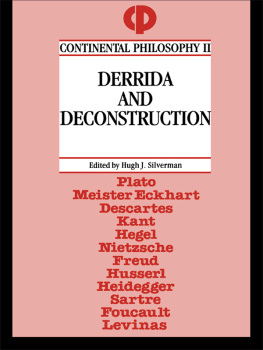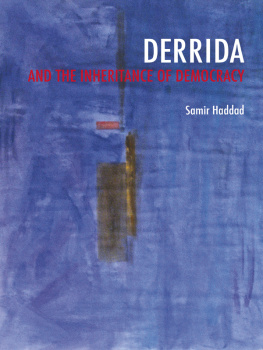Derrida & the Political
A remarkable book The first authoritative study of the political thrust of Derridas work.
Rodolphe Gasch
State University of New York at Buffalo
Richard Beardsworth brilliantly performs a much needed and difficult task.
Peggy Kamuf
University of Southern California
Richard Beardsworth has here begun the difficult task of providing us with the markers for evaluating and thinking the meaning of deconstruction in relation to the presuppositions governing political philosophy in all its traditional guises.
Jay Bernstein, University of Essex
Jacques Derrida is undoubtedly one of the most influential, controversial and complex thinkers of our time. This is the first book to consider the political implications of Derridas philosophical project. It is a timely response to the current political focus of Continental philosophy and to Derridas own recent shift towards the political.
Richard Beardsworth rejects readings that present Derridas work as apolitical, relativist, liberal or tendentially anti-democratic. Rather than deducing an external political stance from Derridas writings, Beardsworth shows that deconstruction itself is inherently political: it is precisely in such central Derridean concepts as aporia that the radical political implications of Derridas thought become most manifest.
Derrida & the Political offers students of philosophy, politics and critical theory a lucid and original account of Derridas work as a political thinker.
Richard Beardsworth is Associate Professor of Philosophy and Literature at the American University of Paris.
Thinking the Political
General editors:
Keith Ansell-Pearson, University of Warwick
Simon Critchley, University of Essex
Recent decades have seen the emergence of a distinct and challenging body of work by a number of Continental thinkers that has fundamentally altered the way in which philosophical questions are conceived and discussed. This work poses a major challenge to anyone wishing to define the essentially contestable concept of the political and to think anew the political import and application of philosophy. How does recent thinking on time, history, language, humanity, alterity, desire, sexuality, gender and culture open up the possibility of thinking the political anew? What are the implications of such thinking for our understanding of and relation to the leading ideologies of the modern world, such as liberalism, socialism and Marxism? What are the political responsibilities of philosophy in the face of the new world (dis)order?
This new series is designed to present the work of the major Continental thinkers of our time, and the political debates their work has generated, to a wider audience in philosophy and in political, social and cultural theory. The aim is neither to dissolve the specificity of the philosophical into the political nor to evade the challenge that the political poses the philosophical; rather, each volume in the series will try to show how it is only in the relation between the two that new possibilities of thought and politics can be activated.
Future volumes will examine the work of Gilles Deleuze, Luce Irigaray, Julia Kristeva, Ernesto Laclau and Chantal Mouffe, Emmanuel Levinas and others.
Derrida & the Political
Richard Beardsworth

First published 1996
by Routledge
2 Park Square, Milton Park, Abingdon, Oxon, OX14 4RN
Simultaneously published in the USA and Canada
by Routledge, Inc.
711 Third Avenue, New York, NY 10017
Reprinted in 1998
1996 Richard Beardsworth
All rights reserved. No part of this book may be reprinted or reproduced or utilised in any form or by any electronic, mechanical, or other means, now known or hereafter invented, including photocopying and recording, or in any information storage or retrieval system, without permission in writing from the publishers.
British Library Cataloguing in Publication Data
A catalogue record for this book is available from the British Library.
Library of Congress Cataloging in Publication Data
Beardsworth, Richard, 1961
Derrida and the political/Richard Beardsworth.
p. cm.(Thinking the political)
Includes bibliographical references and index.
1. Derrida, JacquesContributions in political science.
2. Derrida, Jacques. 3. Deconstruction. I. Title. II. Series.
JC261.D44B43 1996
320dc20 9526620
CIP
ISBN 0415109663 (hbk)
0415109671 (pbk)
Publishers Note
The publisher has gone to great lengths to ensure the quality of this reprint but points out that some imperfections in the original may be apparent.
For my parents,
and in memory
The future can only be anticipated in the form of an absolute danger. It is that which breaks absolutely with constituted normality and can only be proclaimed, presented, as a sort of monstrosity.
J. Derrida, Of Grammatology
Contents
Acknowledgements
This book would not have been written in its present form without my friends Howard Caygill, George Collins, Daniel Gunn and Bernard Stiegler, and without Sylvie Vacher. My gratitude.
My thanks to David Kammerman for his demands of clarification, to students at the American University of Paris, and to the general editors of the series, Keith Ansell-Pearson and Simon Critchley, for their generous supervision of the original manuscript. I also thank the Lounsbery Foundation for offering me a small scholarship which gave me more time to write.
The initial orientation of this book was conceived for my doctoral dissertation at the University of Sussex several years ago under the supervision of Geoffrey Bennington. I would like to record my debt to him here.
Note on Translations
Page references in the text refer to the original French or German texts. They are followed by page references to the English translation, where available, for instance (Heidegger 1935: 11617/152). Otherwise all translations are by the author.
Introduction
With regard to politics and to philosophical reflection on the political, Derridas thinking has often been given short shrift. Admired for the elegance and sophistication of its location of the undecidable in any conceptual gesture, Derridas philosophy avoids, it is argued, problems particular to the domain and history of political and social thought social reality, the logics and formation of power, decision-making and, perhaps most interestingly, the necessity of risk. It is true that the domain of politics is not a privileged object of reflection for Derrida, although recent work of the 1990s has mobilized and reworked the term more immediately than that of the past. That said, one could easily argue that every strategy in which Derridas thought is engaged carries political implications.
It is not my purpose here, however, simply to present an apologia of the political implications of deconstruction. A straightforward apologia of Derridas philosophy would be, after twenty years of a culture of deconstruction in the Anglo-Saxon world, uninteresting and unhelpful. Too many people, as the English expression quaintly puts it, have moved on. Whatever one thinks of the speed of this house-removal, or of the terms in which it has been made, there is also too much that is shifting in our post-Cold War world for one to assume a unilateral defence of a particular set of thoughts and strategies, however complicated they are (and Derrida is complex). It is my purpose, however, to redress the misunderstandings of Derridas thinking on the political which have themselves proved unhelpful to the task of thought and practice which lies ahead of all those who are involved in political reflection today: namely, the reinvention of political concepts to measure up to the technicization and globalization of political communities in the next century. In this respect, I believe that Derridas itinerary concerning the political is exemplary of a certain style of philosophy, or of philosophizing, from which we still have a great deal to learn not only in terms of its conceptual decisions, but also in terms of the very way in which it reflects upon the political. One may agree or disagree with this style; one will, in turn, reflect upon the political all the better for knowing what the terms of agreement and disagreement are.
Next page












